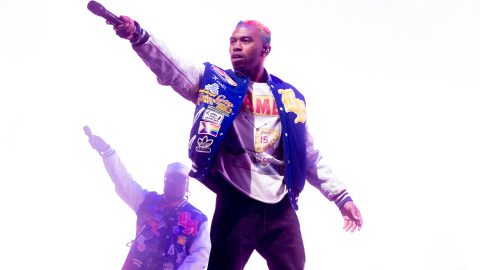
Last week, Singapore hosted two notable games conferences: Gamescom Asia and Gaming Matters 2021. The former is a more consumer-focused event, designed to run parallel to its older, more established sibling – know simply as Gamescom – whilst the latter has more of an industry focus. Gaming Matters sells itself as a conference that celebrates the intersection of gaming, music, sports, and marketing industries, and there’s a good reason it’s positioned in Singapore: the city-state is a rapidly emerging force in gaming. And its importance to the sector is only just starting to make itself known.
When even the Singapore Tourism Board is starting to hop on the bandwagon and embrace gaming as a key part of the country’s culture, you know traditional attitudes are starting to shift. No longer are video games seen as a niche hobby for wayward youths, no – now, the multi-billion dollar industry is at the center of every forward-thinking business person’s mind. Singapore’s games market is expected to be worth at least $130 million by the end of this year – and then $138 million by 2024. The growth in Singapore is undeniable.
That’s why companies as diverse as Epic, Riot, Twitch, ESL Gaming and many, many more besides have made a point of taking up space at Gaming Matters: these companies want to be visible in one of gaming’s most electric markets, and they want to stay there and ingratiate themselves with a keen, technologically-savvy audience.
“Singaporeans have access and appreciation for entertainment from all across the globe, be it Western movies, K-drama, or Japanese games,” explains Riot’s Chris Tran, head of esports for Southeast Asia at Riot Games. “This makes Singapore a really prime market for embracing global trends, and gaming is certainly one stream of entertainment that Singaporeans enjoy variety and accessibility for.
“While other [South East Asian] countries may have larger gaming communities by volume, the Singapore gaming industry is small and mighty with tons of growth potential,” says Riot Games’ regional marketing manager, Nelson Woon. “We enjoy one of the best fibre optic connectivities in the region that can support seamless cross-market play. 5G is commercially available, and there are ample opportunities for esports organisers and gaming companies to deliver great esports experiences here.”
You’re going to be hearing that word a lot in Singapore’s future; esports is the golden goose of gaming for many companies, and why not? It’s an area of entertainment laser-focused on the younger generation – a generation more in-tune with the digital world at large, a generation whose attention is worth money (via the right monetization techniques), a generation with disposable income that’s becoming more and more likely to be spent on – or in – games.

Co-founder of yup.gg, Nicholas Khoo, makes reference to a remarkable quote from Dr Yeo Ning Hong – patron of the Singapore National Olympic Committee – who outlined the importance of Singapore’s relationship with esports in a speech a few years ago. “The Korean girls have done something outstanding by being always among the top 10 in practically all the major championships in golf, with the occasional wins in some of the major tournaments,” he said. “The Russian girls are outstanding in tennis, with their occasional wins also. Singapore should aim to excel in some sport. Since we are generally not gifted in physical prowess, esports may be an area where we can specialise, and excel in due course.”
“Singapore spotted the opportunity to become the esports hub of the region early on, and made all the right moves to provide the capital, events and digital infrastructure,” adds Christel Quek, cofounder and chief technological officer of smartphone entertainment platform BOLT. “And therein lies the flywheel – capital, infrastructure, talent, culture – they all nurture and create momentum for each other.”
We’ve already seen some success stories emerge from Singapore’s gestating games market thanks to this perfect storm of structure, culture and investment – something the UK government could really do with learning from. Both Garena and Razer have roots in the region, and they’ve each gone on to be worldwide names in their own right, dominating various sectors of gaming with the latter becoming a household brand (depending on the household, at least).
“Singapore’s economic history is ripe for technological innovation,” continues Quek. “We’re a small city-state, with little natural resources of our own. So if you look at how we’ve carried out economic exercises to remain competitive at a global level – moving from a manufacturing and services-based economy to a knowledge-based economy and now to a tech and creative hub – Singapore has no choice but to be at the top of our game with the latest technology. It’s not just our culture, it’s our survival M.O. to be competitive on the technological front.
“We’re the ‘David’ amongst the ‘Goliaths’, and technology – and the economy we’ve built to support it – is our ‘slingshot’.”

The infrastructure and technology point that our interviewees all make is key; Europe and the US are only starting to see proper 5G support manifest now, but Singapore has had it for a while – on top of high-speed internet connections, too. Top esports teams rely on decent connections to compete and train and, Khoo tells us, even “the top Korean esports team came to Singapore to train at yup.gg office for two months,” such was the integrity of its internet connection. You can’t become an esports hub if the players don’t see your city as a viable place to compete (and even live), and that’s something the decision-makers in Singapore are acutely aware of.
“[Singapore is so positioned to take advantage of the gaming market at the moment] thanks to a concerted government support including SportSG, EDB, STB and IMDA all pushing in the same direction to attract large gaming organisations to Singapore, upskill the local workforce and train local gamers,” says Jasper Donat, the mastermind behind Branded, the company that runs AllThatMatters, Music Matters, Gaming Matters, Digital Matters, Sports Matters and a wealth of other conferences.
Khoo agrees, saying: “Our government is investing in growing tech and gaming industries, and the Singapore Tourism Board is supportive of major gaming and esports events. Government agencies and NGOs are championing initiatives such as SuperGamerFest and Gamescom Asia.”
“Singapore is a regional hub for the [Asia-Pacific region], and it’s well-known that our geographical position makes it ideal for companies to set up their headquarters here and attract top talent. It’s a strong recipe for success,” Quek adds.
And the talent isn’t what you’d expect from a more traditional view of gaming (that is to say almost exclusively young, white and male). “Changing attitudes in Singapore opened the doors for more female gamers to make a name for themselves in a traditionally male-dominated space,” explains Woon from Riot. “In a survey of online gaming conducted by Rakuten Insight in March 2020, 55% of female Singaporean respondents stated that they played online games.
The same survey found that 40% of female respondents preferred playing massive multiplayer online role-playing games (MMORPG) and real-time strategy games, such as League of Legends.”

This trend of increasing female participation in gaming can be seen reflected globally, but Singapore, and the company’s operating within it, are responding to it quickly. “Almost 50% of gamers are women,” adds Donat. “And you have to remember that the cliche gamer profile of a teenage boy playing esports with a RedBull in hand is only a small (but very noisy and growing) part of the market.”
“Mobile gaming and its uptake in Singapore has also increased player diversity,” adds Tran. “With barriers to entry being historically lower for mobile gaming, female participation is higher with mobile games than traditional PC or console games.”
This increase in female gamers has also translated to more female participation in esports tournaments, Woon explains, which is why Riot has made supporting women in Singapore specifically a key area of focus. “This year, we introduced the Game Changers initiative to Valorant esports to provide opportunities and exposure to women and marginalized genders, and in SEA, actively work with the Female Esports League (FSL), a leading Southeast Asian esports organizer that hosts independent, female-only esports leagues.”
It makes sense; if you’re trying to appeal to as much of a country’s population as possible, you’re not going to want to alienate half the potential audience, are you? “As a proud nerd myself, I think we can all agree, gaming is no longer seen as the sole domain nor revenge of the nerds anymore!” Quek says, notably, as a professional woman in the sector. “The attitude has changed indeed; gaming has been legitimised as a professional sport – a profession, even.”
So the ground was primed for Singapore to become a behemoth in the gaming world before Covid-19 and a period of brief international downtime for the games industry at large. The global lockdowns weren’t entirely bad news, of course – ”the Covid-19 pandemic has had a role in accelerating the growth of gaming and esports as people spend more time at home,” per Tran. Tran notes that we can expect this growth to continue, too, “as restrictions start to lift and companies explore the possibility of live, offline events once more”.
But aside from attracting esports teams – and their owners, and their fanbases, and their franchises – what else can gaming offer Singapore in the months and years to come? For many, the focus is on events. In-person events and networking form the backbone of any emergent industry, and gaming is no different – especially given we’re recovering from a global pandemic.
”The pandemic taught us a lot about en vivo,” says Quek. “It taught us how much we value coming together in crowds, and how vulnerable and resilient the events industry can be. The pandemic was a mere accelerant to bringing more live events online. For gaming (which was always a native to online to begin with and then branched out into live in-person events,) I think the industry has the upperhand in leading the way on not just what best practice looks like for best in online eventing, but how to keep an audience engaged.”
It’s a sentiment Donat echoes: “[We should expect to see] more companies, more infrastructure, more physical venues and digital events from Singapore in a year’s time,” he notes.

Riot’s Woon concurs, saying: “What [Riot] hopes to see in a year’s time would be a healthy growing community and more opportunities to host events and collaborations with local companies and brands to bring unique and memorable experiences for our players.”
“Singapore will continue to be quite a focal point and hub, almost a flight to safety as the world continues to grapple with the pandemic,” adds Khoo.
Between esports, Singapore’s designation as a virtual and physical hub and the way its culture is keen to embrace the changing face of gaming, it’s safe to say the state is in a strong position looking into the future. “Everyone has finally sat up and taken notice that gaming is here, it’s exciting and it’s only going to get bigger,” says Donat. “With more investment in more companies coming to Singapore, we can only expect the growth to continue.”
Singapore has long been Asia’s media hub, and thanks to the state’s willingness to be fluid in step with a quickly evolving industry – and its openness to change – it’s safe to say it’ll soon be as integral to the games industry at large as California, London, Tokyo or Berlin.
Gaming Matters 2021 took place at Singapore’s Suntec convention centre from October 14-15. Catch up on Gaming Matters at the Twitch channel, YouTube channel and if you are registered, you can watch directly on www.gamingmatters.asia.
The post Gaming Matters 2021 shone a light on why Singapore is so important to the games industry appeared first on NME.







